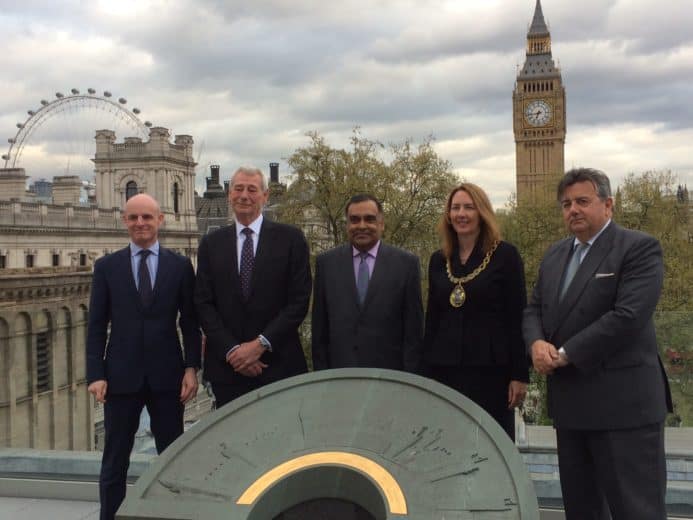Event summary: Modi’s Campaigns, 12th April 2017
UKIBC guests met on 12 April for the first event in a series that will ask the audience to reflect on their experiences in India, 3 years into the Modi government

Hosted by RICS, members presented questions to HE Mr YK Sinha, High Commissioner of India to the UK, David Whittleton, Deputy Chairman, Arup, Philip Bouverat, Director, JCB and Kevin McCole, Chief Operating Officer, UK India Business Council. The following report provides a summary of the key points and themes that emerged during discussions.
There was agreement among members that, broadly, the wide ranging political and economic reforms instituted by the Modi government are having a positive effect. India is becoming more accessible and more open to foreign investment – something the UK has responded to – becoming the biggest G20 investor in India. Both nations are working to strengthen trade and political relations, with the UKIBC playing a pivotal role in this. Looking forward, the success of the BJP at state elections looks positive for BJP/NDA success in future elections and, poverty alleviation and poverty elimination, across particularly, rural India, remains a cherished goal of the current government.
Progress on key government initiatives; Make in India, Start-up India, Digital India, Smart Cities, Skill India, Clean Ganga and E-gov is occurring at different rates. Overall, the Make in India campaign has attracted USD 130 billion in FDI since it launched. Despite this, India remains low on the Ease of Doing Business index. Ranked now at 130, it has improved since 2015 but there is still a long way to go – a sentiment echoed among UKIBC members and clients.
The ‘Clean Ganga’ programme is now supported by a broad consortium of stakeholders from India and the UK. With the Scottish Government promising funding, and all stakeholders sourcing the technology and financing needed. It is early days, but the momentum behind this initiative is strong, with private sector, universities in the UK and IIT Kanpur taking a lead.
India’s national mission for financial inclusion, Jan-Dhan Yojana, saw 300 million bank accounts opened in 2016. With the idea to have more money moving through banking systems rather than being held in cash, to eliminate leakage, to revolutionise how poverty is eliminated, and, to lay the foundations for Digital India/ FinTech revolutions.
In the first instance, demonetisation sent shock waves throughout the economy and resulted in a short term drop in India’s growth rates, but the initial prognosis is positive and Jan-Dhan Yojana ensured more peoples’ money was protected. Part of the financial reforms instituted by the Modi government, demonetisation did not cause too many problems for UK businesses trading, and established, in India.
India has recently introduced the Goods and Services Tax (GST) which is likely to be implemented from 1st July 2017. Highly anticipated by both companies and consumers alike, this revolutionary reform is expected to replace the current labyrinthine tax system (which has been a significant barrier to swift and economic trade) with a single unified tax structure and thus radically change the landscape of doing business in India.
Growth of Fintech in India is constrained by slow digital infrastructure developments and poor trust in digital identities/online financial services. Although the Digital India initiative is as yet at a nascent stage, there is hope that it will develop rapidly and will have far reaching benefits for both public sector services and private sector trade.
India is particularly looking to the UK for support developing its digital financial services and higher education capacities.
The PM’s ‘Educate in India’ campaign coupled with Indian educational institutions’ push for internationalisation and upgradation has opened up exciting new opportunities for UK universities and business schools to collaborate with their Indian counterparts and corporates through both online and offline routes. One of India’s key priorities is to capitalise on its huge demographic dividend by ensuring that its youth are equipped with the skills required by industry and this is where the Skill India initiative becomes very relevant.
The combined focus of the Modi Government on transforming India into a global manufacturing hub and improving its infrastructure, technology and operating environment has created plentiful business opportunities for UK businesses working in India. To truly achieve sustainable growth and improve productivity however, the Government needs to urgently prioritise education and social policy initiatives much more than it is currently doing.
UK companies have a strong competitive advantage and hold a unique negotiating position with India compared to other nations, including ASEAN. With close and historic cultural ties and highly developed research and development capacities across all sectors in the UK, there is major potential for a much greater volume of bilateral trade and investment between the two countries.
The take home message, from this first event to garner opinions on 3 years of Modi government, is positive. There is growing momentum and growth, and change is certainly occurring. However, the shared consensus is that more time is needed to see how impactful the current reforms will be.



